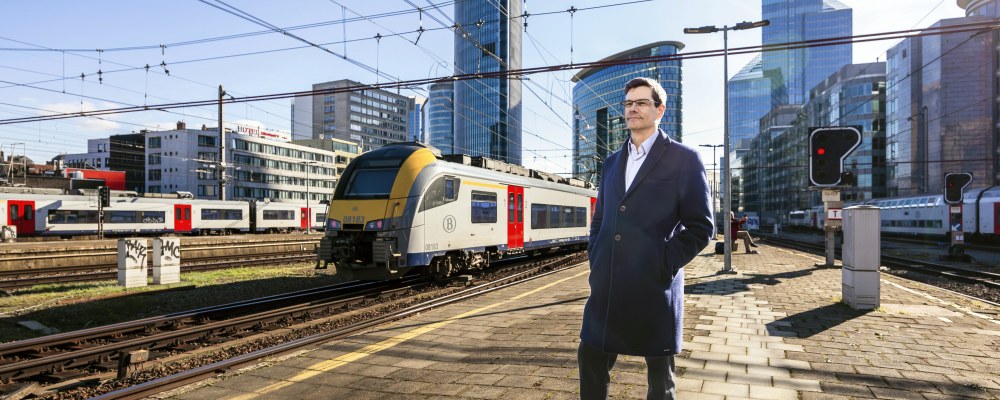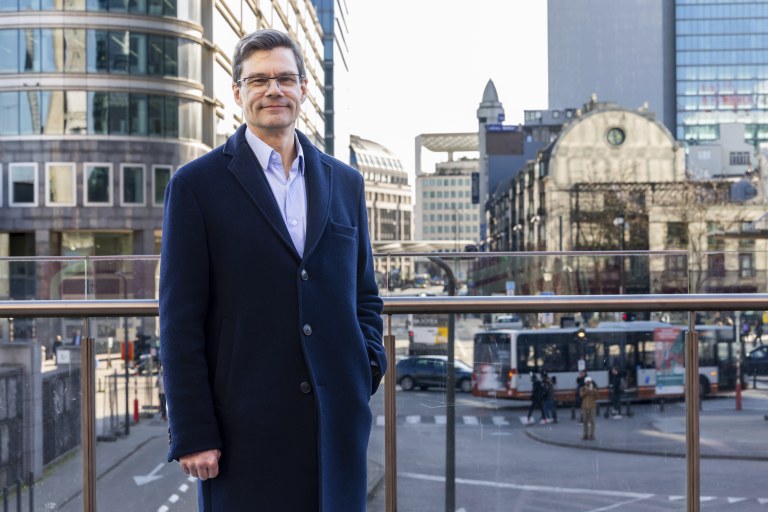
Timo Hallantie, Head of Unit at the European Innovation Council encourages Finns to pursue an EU career.
“The greatest thing is realizing that you are doing something important for all of Europe. I work with the latest technologies and get to see what is emerging. Europe is at the forefront of innovation right now in the digital industry and many other industries as well, and the rest of the world is pretty much following its lead.”
EU recruitment competitions state the salary grade and age bonuses are added to the salary. The entry-level grade (AD 5) for administrators with a university degree ranges from 5 300 to 6 000 euros.
“That will double or triple as you progress higher in your career. Finns should still review the other benefits carefully – some things, like holidays, are better in Finland, whereas others are better in the EU package.”
The salary is increased, for example, by the expatriation allowance, family benefits and an annual visit to the home country for the whole family. Income tax is lower than in Finland and is only paid to the EU.
Remote work is possible three days a week. You accrue four weeks of annual leave, which increases to five weeks after you have gained some work experience. You are entitled to a pension after at least 10 years of service or at the age of 66.
“Finding employment for your spouse is a big question to consider, but an academically educated person will eventually find a job. There are lot of international companies and various lobbying organizations here. Brussels is one of the easiest cities in Europe to live as an expat and you can get by in English.”
Career boost from Brussels
Timo Hallantie graduated as a Master of Science in Technology from the Helsinki University of Technology in 1994 when Finland was about to join the European Union. Young officials were hired by ministries and agencies as “Euro advisors”.
Hallantie had written his thesis in information technology on the topic of technology partnerships for TEKES and was offered a job as an information officer of the Tekes R&D secretariat. Tekes was a Finnish government agency that provided funding for the R&D projects of businesses, universities and other higher education institutions and research institutes. This work is now continued by Business Finland, operating under the Finnish Ministry of Economic Affairs and Employment.
“I spent part of my time at the Embassy of Finland in Brussels, helping Finnish companies with EU programme applications.”
As a result of Finland’s membership, Finns became eligible to participate in EU recruitment competitions in 1995. Hallantie made it to the reserve list from which EU institutions look for candidates for open positions. Meanwhile, he worked at Tekes and as a consultant for PriceWaterhouseCoopers.
Good to know about finance
The move to Brussels took place in September 1998. Hallantie started out working as an administrator at the DG for Information Society and Media, which has since been replaced by DG Connect, the Directorate-General for Communications Networks, Content and Technology. During an internal career selection discussion, he heard of a supervisory position in financial administration and, following a competition, went on to become Deputy Head of Unit.
“That was something I had never done before and would not have applied for had it not been for the advice to expand my expertise. It’s good to know something about finance, especially in the EU.”
He then became Head of Unit at the European Research Executive Agency (REA), and in 2021, Head of Unit of the Pathfinder programme of the new European Innovation Council (EIC).
“I got to set up a whole new unit. I received a handful of people from various parts of the Commission and, within a few months, I had to get the team working together and get things rolling and growing. Naturally, everyone had strong opinions of what we should do and how. So that was a nice challenge as a supervisor.”
The unit headed by Timo Hallantie now consists of nearly 40 officials. He also maintains contact with other officials in member states, the scientific and innovation communities of the EU and the wide group of experts who assess project proposals and monitor projects.
Future technology
The Pathfinder is a programme under Horizon Europe, the EU’s framework programme for research and innovation for the period 2021–2027. The programme pursues bold technological breakthroughs by funding their early-stage development.
“We look for ambitious projects featuring new and exciting technologies that are not yet available in the market.”
Pathfinder allocates 300–400 million euros to new projects every year. There is an open application round in spring and various themed challenges in autumn.
Finnish universities and research institutes have been commendably active; the University of Helsinki and VTT, for example, are very much involved in the projects.
“Pathfinder has perhaps the most competition under Horizon: about seven per cent of the proposals receive funding.”
The proposals are assessed by an independent group of experts, and the team led by Hallantie makes the final decision. Since the projects last for several years, there are approximately 500 projects in progress, with EU funding of roughly 1.7 billion euros in total.
“We are running quite a big budget and a high project volume. It is important in my job to allocate resources to the right things and keep everyone’s eye on the ball.”
On the weekends, Hallantie clears his mind by going sailing. He has a boat waiting on the Dutch shore, just a 1.5-hour drive away.

Foot in the door
There are roughly 40 000 people working at EU institutions. Those with a degree in technology have multiple opportunities to choose from.
“Many of the available positions are for specialists, and the Commission is in urgent need of people with special expertise. Candidates over 50 have also been recruited, they also do quite well in the competitions,” says Timo Hallantie.
The new competition model introduced last year includes one day of written tests: a multiple-choice test on EU-related knowledge as well as verbal, numerical and abstract reasoning tests. The remote competitions also include a case assignment that assesses the candidate’s communication skills and some also have a test that measures digital skills.
Those who pass are put on a reserve list from which EU institutions can select candidates for interviews.
“You don’t need to know French, but your English skills should be good and your delivery adequate.”
The aim is to speed up recruitment processes to take no more than half a year. Those on the list should continue applying for open positions, and by taking part in multiple competitions, you will become more skilled at completing them successfully.
You cannot apply for the traineeship programme until you have graduated university. The Generalist competitions are for general administrators who are at the start of their career. The Specialist competitions are for specialists in particular fields who have more work experience. Specialists are also needed for temporary contract jobs.
“As a general rule, you should also take odd jobs seriously – they may prove to be important. One of your contacts may notice that this person does their job really well.”
More information:
https://eu-careers.europa.eu/en
https://vnk.fi/eu/tyopaikat (in Finnish)